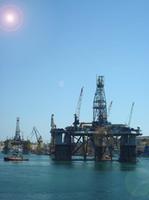Second meeting of the OFOG Sub-Group on Environmental Impact – 27/06/2019
Mitigating risks of oil and gas activities in the Mediterranean
The OFOG Sub-Group on Environmental Impact held its second meeting in Athens, Greece, on 27-28 June 2019 with support from the Italian Ministry for Environment, Land and Sea Protection. OFOG -- Offshore Oil and Gas Group – is an ad hoc working group coordinated by REMPEC and established in 2012 with a view to facilitating the effective implementation of the Offshore Protocol of the Barcelona Convention. OFOG is composed of representatives of the Contracting Parties and Observers representing the concerned industries, relevant international organisations and UN Environment/ Mediterranean Action Plan (MAP) partners.
During the meeting, representatives of the Contracting Parties to the Barcelona Convention and MAP Partners examined an assessment of the implementation status of the Mediterranean Offshore Action Plan and discussed possible revisions to the Annexes of the Offshore Protocol.
The OFOG Sub-Group on Environmental Impact meeting reviewed three guidelines prepared on the basis of different articles of the Offshore Protocol, addressing the conduct of Environmental Impact Assessment (EIA) for offshore activities, the disposal of harmful substances emanating from offshore oil and gas activities in the Mediterranean, including oil and oily mixtures and drilling fluids and the establishment of restrictions and conditions for offshore activities in Specially Protected Areas (SPAs). The meeting agreed that two guidelines should be submitted to the meeting of the MAP Focal Points (Athens, Greece, 10-13 September 2019).
While acknowledging progress in the implementation of the Mediterranean Offshore Action Plan, participants called for additional technical and capacity building activities to foster Contracting Parties’ efforts for its further implementation. They also considered necessary that, in the course of its implementation, due consideration should be placed on recent developments under the Barcelona Convention, notably the implementation of the Integrated Monitoring and Assessment Programme, the Ecosystem Approach and Marine Spatial Planning. The meeting agreed that a mandate should be given by the forthcoming Meeting of the Contracting Parties to the Barcelona Convention (COP 21, Naples, Italy, 2-5 December 2019) to launch a process for the update of its Annexes, in line with the rules and regulations of the UN Environment/MAP—Barcelona Convention system.
The Offshore Protocol aimed at the “Protection of the Mediterranean Sea Against Pollution Resulting from Exploration and Exploitation of the Continental Shelf and the Seabed and its Subsoil”, was adopted under the Barcelona Convention in 1994 and entered into force on 24 March 2011. To date, the Offshore Protocol has been signed by 12 Contracting Parties and ratified by 8 Contracting Parties. Its purpose is to mitigate risks of significant accidents related to the intense offshore activities in the Mediterranean. Due to the enclosed nature and special hydrodynamics of the Mediterranean Sea, leakage of harmful substances from offshore drilling and related activities can have long-term adverse consequences for ecosystems, fisheries and the economies of Coastal States.
Source of the publication: UN Environment/MAP


